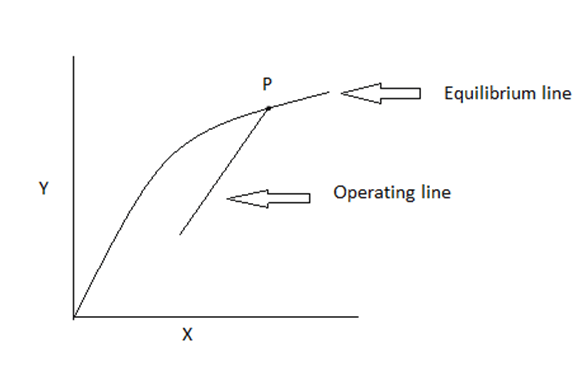Question

a.
Zero
b.
Infinity
c.
One
d.
Greater than one
Posted under Mass Transfer
Interact with the Community - Share Your Thoughts
Uncertain About the Answer? Seek Clarification Here.
Understand the Explanation? Include it Here.
Q. Find the driving force at the point (P) in the equilibrium distribution curve given below.
Similar Questions
Explore Relevant Multiple Choice Questions (MCQs)
Q. Find the slope of the operating line from the figure below.
Where,
Ls,Gs- non diffusing solvent
X,Y- Concentrations in mole ratio
x,y- concentration in mole fraction
View solution
Q. Find the concentration representation in the equilibrium distribution curve given below.
View solution
Q. Identify the relation between the slope of two operating line in the given figure.
View solution
Q. Name of the line PR and QT, If X, Y – are represented in mole ratio.
View solution
Q. Find the abscissa and ordinates of the graph.
If X,Y –Concentration in mole ratio
x,y- Concentration in mole fraction
View solution
Q. The figure given below is a single stage ideal co- current process of solute transfer from liquid to gas phases.
View solution
Q. Find the operating line slope.
Where,
X,Y- concentration in mole ratio of liquid and gas phase
x,y-concentration in mole fraction
Gs,Ls- mole free basis( non-diffusing solvent)
View solution
Q. Look out the figure below. At the position (X), which of the following will be remains same as it enters into the process.
View solution
Q. Find the x & y co-ordinate in the figure below at steady state. Here, the gas phase and liquid phase mole fraction representation is given below.
View solution
Q. ______________ is defined as the number of equilibrium stages to the number of real stages.
View solution
Q. Murphree efficiency is defined as the number of equilibrium stages to the number of real stages.
View solution
Q. (Yn- Yn-1)/ (Yn*-Yn-1) is
View solution
Q. The main purpose of cascades is
View solution
Q. More than one stages are interconnected to form
View solution
Q. Ideal stages are also known as
View solution
Q. A device where two insoluble phases are brought into contact is known as
View solution
Q. For Air-Water system Lewis Number equals to
View solution
Q. Removal of ammonia from the air with water is an example of a counter-current process.
View solution
Q. The driving force line between the operating line and the equilibrium line depends on
View solution
Q. Only small equipments are required for co-current process.
View solution
Recommended Subjects
Are you eager to expand your knowledge beyond Mass Transfer? We've handpicked a range of related categories that you might find intriguing.
Click on the categories below to discover a wealth of MCQs and enrich your understanding of various subjects. Happy exploring!








